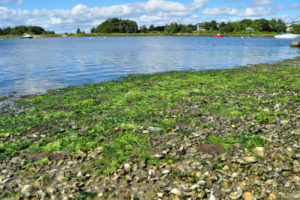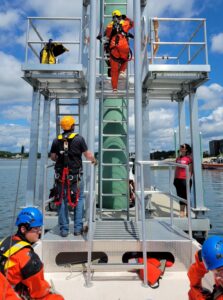WEST FALMOUTH – The Buzzards Bay Coalition says that two scheduled upgrades to the septic system on West Falmouth Harbor will deploy new state-of-the-art technologies to reduce nitrogen pollution as part of an ongoing effort to help restore the harbor’s health.
The upgrades will take place at the West Falmouth Fire Station and the College Light Opera Company campus.
Nitrogen pollution fuels the growth of algae and has led to the loss of underwater eelgrass beds and fish and shellfish populations in the harbor.
The Coalition has been working with the town of Falmouth since 2015 to demonstrate workable solutions to nitrogen pollution from septic systems. Septic systems have been found to be the largest source of nitrogen pollution in West Falmouth Harbor.
As part of this project, the Coalition has been upgrading septic systems on West Falmouth Harbor and installing various nitrogen-reducing technologies. Most homes around the harbor use traditional on-site septic systems and cesspools, which do not remove nitrogen from wastewater.
The first phase of this demonstration project resulted in a 78% reduction in nitrogen pollution from 20 upgraded septic systems.
The coalition is now working to upgrade 10 more systems around West Falmouth Harbor as part of Phase 2 of the effort. The systems introduce different nitrogen-reducing technologies to give homeowners more choice.
There are many types of nitrogen-reducing septic systems available today – which was not the case even a few years ago.
Two of the newest upgrades will use two versions of a system that have been shown to reduce nitrogen by an estimated 95% compared to traditional septic systems in demonstrations on Martha’s Vineyard and at the Massachusetts Alternative Septic System Test Center.
The West Falmouth Fire Station will use a system called NitROE, which has a separate denitrification tank that’s installed between the septic tank and the leach field. The NitROE tank aerates wastewater and then uses wood chips to remove nitrogen before the wastewater flows to the leach field.
The campus of the College Light Opera Company (CLOC), on Harbor Head in West Falmouth, is receiving the other upgrade. Approximately 90 students live on the four-building campus each summer, performing operettas and musicals at nearby Highfield Theatre throughout the season. It’s the largest resident theatre company in the United States.
CLOC’s campus currently has four cesspools and two Title 5 systems that collect wastewater from the various buildings. The new nitrogen-reducing system, called SanTOE, will replace all of those polluting systems with one main system that treats wastewater from the entire campus.
The systems are expected to be installed and operational by next spring.
By TIM DUNN, CapeCod.com News Center























